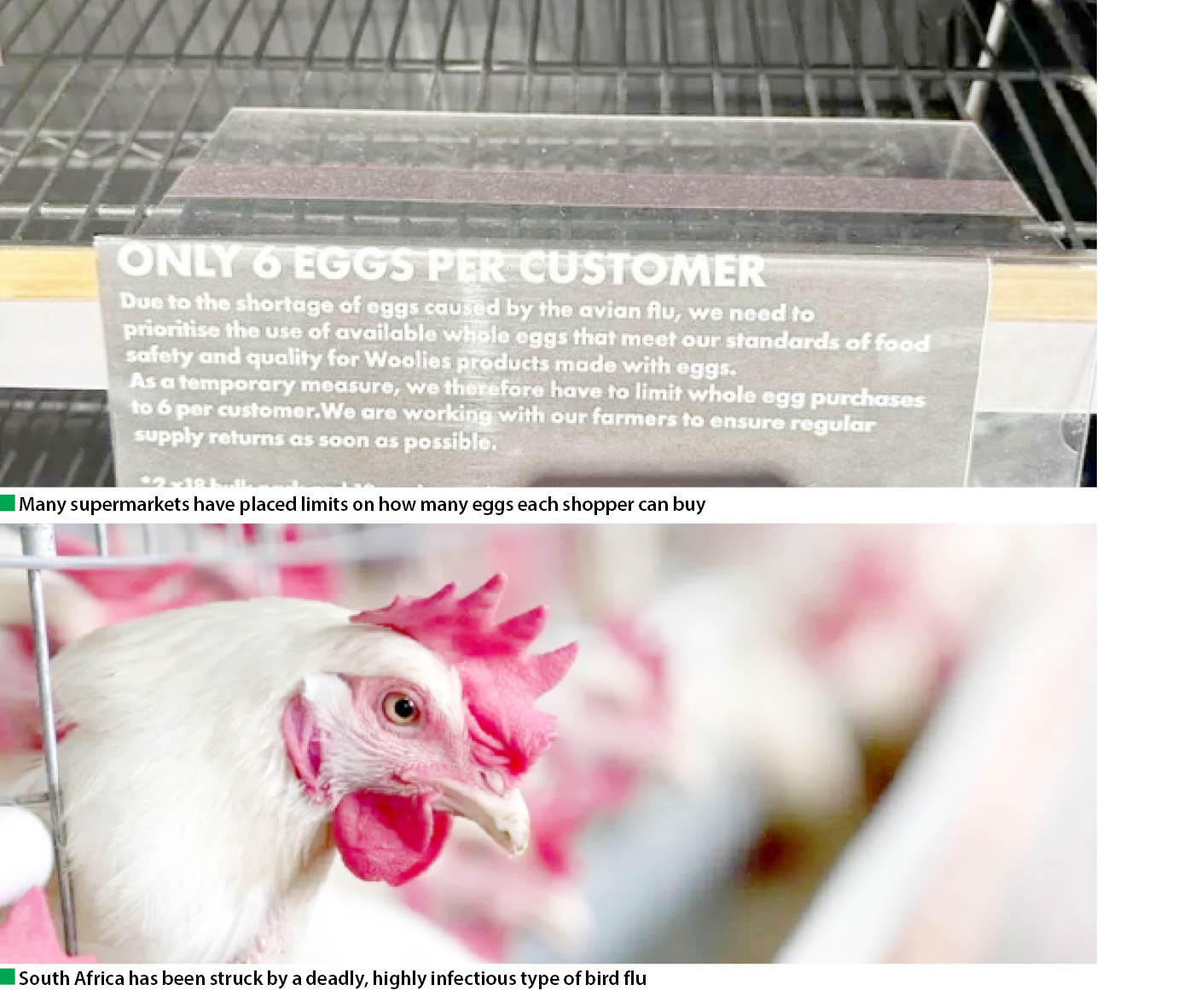Eggs are currently South Africa’s hottest commodity
The country has been grappling with one of its worst outbreaks of bird flu – millions of chickens have been killed over the past few weeks, supplies of poultry meat have been threatened and supermarkets across the nation have run out of eggs.
Experts predict the egg shortage will cause the popular ingredient to jump in price – far from ideal considering it is one of the most affordable sources of protein for the millions living in poverty.
Retailers, farms and industry giants have also been hit, with the nation’s largest chicken producer stating the flu had “ravaged” a sector already burdened by rising costs and an electricity crisis.
In an effort to stop the spread of Highly Pathogenic Avian Influenza – a deadly, extremely infectious type of bird flu – farmers have culled more than seven million egg-laying chickens. That amounts to 20-30% of the country’s entire chicken stock, according to South African Poultry Association.
As a result, social media sites have been inundated with pictures of bare supermarket shelves, while many shoppers found that shops still selling eggs have set limits on how many can be bought.
Online shopping sites are no better – several consumers hoping to buy eggs on the web have been met with “unavailable” or “low in stock” messages.
No more cheap eggs
Domestic worker Nomalanga Moyo buys eggs every week in order to make muffins for her children’s lunchboxes.
Her store of choice is a spaza shop – the term for a small informal outlet – in her township of Diepsloot. Here, she can buy any quantity of eggs – when funds are low, she is able to get just two eggs for about 2.50 rand (13 cents; 11p). However, this week, the store was totally out.
“I am now going to wait until I go to work during the week to see if I can find eggs at the normal shops. However, it will cost me more,” a worried Ms Moyo said.
More than half of South Africans live below the poverty line. They already spend about 35% of their income on food and according to the Pietermaritzburg Economic Justice and Dignity research group, this share will likely increase as a result of the egg shortage.
“Not only will consumers spend more for eggs but the rising price of eggs will affect all other food products where producers use eggs and other poultry products,” it said.
Businesses have also been impacted by the flu.
In a trading update at the end of last month, leading South African poultry producer Astral Foods said the outbreak had so far cost it $11.5m.
Astral said the flu has “spread at an alarming pace” and ravaged the poultry industry. The company also joined other producers in warning that South Africa could experience a shortage of chicken meat over the next few months.
Small businesses, which are less able to weather market shocks, have also voiced concerns.
“After baking scones for a client yesterday I was left with three eggs. I went shopping after to find more eggs but the price was too much for me,” Zamapholoba Ngcobo, a bakery owner in the city of Pietermaritzburg said.
The shortage could not have come at a worse time, Ms Ngcobo said, as wedding and graduation season means cake orders are at an “all-time high”.
But where there are losers, it seems there are always winners.
Ukulinga, a poultry farm in KwaZulu-Natal province, saw news of flu outbreaks in Brazil and Argentina earlier this year and implemented strict biosecurity measures as a precaution.
Nkululeko Ngidi, a manager at the farm, said: “When we started the farm we had to go out looking for business. Now that our farm is among the few that are free from bird flu, customers are looking for us.
“We have seen increased demand… we at the moment supply 130,000 eggs to businesses in the area on a weekly basis.”
Unfamiliar strain
Farmers and industry experts estimate it will take six months for the poultry sector to replace the chickens it culled – meaning any shortage of poultry products could last through the festive season and into 2024.
Paul Makube, an agriculture economist at First National Bank, told the BBC: “The outbreak has moved at a rapid pace, it is worse than what we saw during the outbreak in 2017. A further complication comes from the fact that we are dealing with a strain we have not previously dealt with.”
Concern has spread beyond the border – Namibia, which imports most of its poultry from South Africa, banned poultry products from its neighbour amid the outbreak.
In an effort to reassure its consumers and businesses, South Africa’s government announced that it is considering purchasing bird flu vaccines.
And for the lucky South Africans that can actually find eggs in the shops, officials have stressed chicken products on shelves are safe for consumption.
Source: www.bbc.com

 Join Daily Trust WhatsApp Community For Quick Access To News and Happenings Around You.
Join Daily Trust WhatsApp Community For Quick Access To News and Happenings Around You.